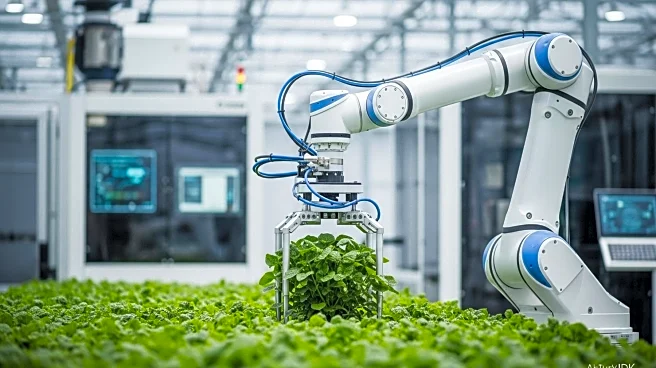What is the story about?
What's Happening?
Modern agriculture is increasingly integrating AI and robotics to address challenges posed by climate change, such as prolonged dry seasons and water scarcity. Agtech companies like Agripass are developing robotic systems that enhance yield, soil health, and water quality while reducing reliance on herbicides. Despite the high costs and reliability issues that have led to the bankruptcy of several robotic harvesting companies, innovations like FineField's solar-powered blueberry picker demonstrate potential success. Adaptive selective tilling (AST) technology is being used to improve soil water retention and reduce greenhouse gas emissions. In Washington state, precision automated irrigation systems have significantly reduced water usage and increased crop yields. These advancements are helping farmers optimize resources and improve sustainability.
Why It's Important?
The integration of AI and robotics in agriculture is crucial for addressing environmental and economic challenges. By improving efficiency and sustainability, these technologies can help farmers reduce costs and increase productivity. The reduction in water usage and greenhouse gas emissions contributes to environmental conservation efforts. Additionally, the ability to optimize labor and resource allocation can enhance competitiveness in the agricultural sector. As climate change continues to impact traditional farming methods, the adoption of smart technologies offers a pathway to resilience and sustainability, ensuring food security and economic stability.
What's Next?
The continued development and adoption of AI and robotics in agriculture are expected to expand, with more farmers likely to invest in these technologies to improve efficiency and sustainability. As these systems become more reliable and cost-effective, they may become standard practice in the industry. Stakeholders, including policymakers and agricultural organizations, may focus on supporting research and development to further enhance these technologies. The potential for collaboration between tech companies and farmers could lead to innovative solutions that address specific regional challenges, such as water scarcity and soil degradation.
Beyond the Headlines
The shift towards technology-driven agriculture raises ethical and cultural considerations, such as the impact on traditional farming practices and rural communities. While technology can reduce labor demands, it may also lead to job displacement, necessitating retraining and education programs. The reliance on data-driven systems highlights the importance of data privacy and security in the agricultural sector. Long-term, the integration of AI and robotics could transform the cultural landscape of farming, balancing tradition with innovation to meet global food demands.

















